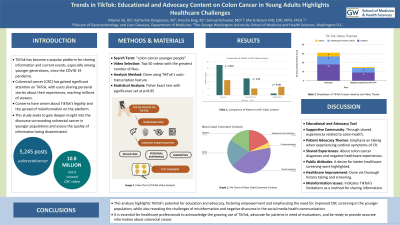Tuesday Poster Session
Category: Colorectal Cancer Prevention
P3823 - Trends in TikTok: Educational and Advocacy Content on Colon Cancer in Young Adults Highlights Healthcare Challenges
Tuesday, October 29, 2024
10:30 AM - 4:00 PM ET
Location: Exhibit Hall E

Has Audio

Maanvi Vij, BS
George Washington University School of Medicine and Health Sciences
Washington, DC
Presenting Author(s)
Maanvi Vij, BS1, Katherine Rangoussis, BS, MS1, Anosha Baig, BS2, Samuel A.. Schueler, MD1, Marie L.. Borum, MD, MPH, FACG1
1George Washington University School of Medicine and Health Sciences, Washington, DC; 2GW MFA, Washington, DC
Introduction: TikTok has emerged as one of the most effective ways of sharing information among the younger generation. Colorectal cancer (CRC), in particular, has become a subject of interest amongst TikTok users with CRC being diagnosed at younger ages. There have been debates about TikTok’s legitimacy with concerns about the dissemination of misinformation. This study analyzed TikTok videos on CRC in young adults for content and reliability of information.
Methods: The key phrase “colon cancer younger people” was searched on TikTok to identify the top 50 videos according to frequency of ‘likes’. Videos were categorized based upon gender and identity/profession of the creator. Video content was thematically classified. Subsequent evaluation assessed accuracy of CRC information. Statistical analysis was performed using Fisher Exact test with significance set at p< 0.05.
Results: In the 50 TikTok videos, 30 creators were female and 20 male. 19 (15 female, 4 male) were patients, 22 (8 female, 14 male) healthcare providers (HCP) and 9 (6 female, 3 male) were others (including naturopaths, advocates, and teachers). There was no difference in the gender of patients (p=0.2414) or HCP (p=0.1308) posting videos. The primary thematic categories were advocacy (18 by patients, 9 by HCP, 4 by other), and experience with HCP (9 by patients, 5 by HCP, 1 by other). Patients more frequently promoted advocacy (p< 0.05), with 30% reported being dismissed by HCP. Patients compared to HCP more frequently (p=0.003) advocated for colonoscopies. 14 (28%) videos included information from an external source (10 HCP, 4 other), with advocates and teachers more often (p=0.04) offering information from news articles compared to peer-reviewed articles. 8 videos (16%; 1 patient, 5 HCP, 2 other) had misinformation about CRC, occurring more often (p=0.002) in videos by HCP incorrectly citing data and guidelines compared to patients and those in the “other” category.
Discussion: TikTok can serve as a powerful tool for education and advocacy, offering the opportunity to create a virtual community through shared experiences or ideas. It has been used to provide information about CRC in young adults and offers insight into patient and HCP perspectives. Patient videos highlight advocacy for CRC screening. Video content review also revealed inaccurate information about CRC. It is critical that HCP recognize the increased use of TikTok, advocate for patients requiring evaluations and be prepared to provide accurate information about CRC.
Disclosures:
Maanvi Vij, BS1, Katherine Rangoussis, BS, MS1, Anosha Baig, BS2, Samuel A.. Schueler, MD1, Marie L.. Borum, MD, MPH, FACG1. P3823 - Trends in TikTok: Educational and Advocacy Content on Colon Cancer in Young Adults Highlights Healthcare Challenges, ACG 2024 Annual Scientific Meeting Abstracts. Philadelphia, PA: American College of Gastroenterology.
1George Washington University School of Medicine and Health Sciences, Washington, DC; 2GW MFA, Washington, DC
Introduction: TikTok has emerged as one of the most effective ways of sharing information among the younger generation. Colorectal cancer (CRC), in particular, has become a subject of interest amongst TikTok users with CRC being diagnosed at younger ages. There have been debates about TikTok’s legitimacy with concerns about the dissemination of misinformation. This study analyzed TikTok videos on CRC in young adults for content and reliability of information.
Methods: The key phrase “colon cancer younger people” was searched on TikTok to identify the top 50 videos according to frequency of ‘likes’. Videos were categorized based upon gender and identity/profession of the creator. Video content was thematically classified. Subsequent evaluation assessed accuracy of CRC information. Statistical analysis was performed using Fisher Exact test with significance set at p< 0.05.
Results: In the 50 TikTok videos, 30 creators were female and 20 male. 19 (15 female, 4 male) were patients, 22 (8 female, 14 male) healthcare providers (HCP) and 9 (6 female, 3 male) were others (including naturopaths, advocates, and teachers). There was no difference in the gender of patients (p=0.2414) or HCP (p=0.1308) posting videos. The primary thematic categories were advocacy (18 by patients, 9 by HCP, 4 by other), and experience with HCP (9 by patients, 5 by HCP, 1 by other). Patients more frequently promoted advocacy (p< 0.05), with 30% reported being dismissed by HCP. Patients compared to HCP more frequently (p=0.003) advocated for colonoscopies. 14 (28%) videos included information from an external source (10 HCP, 4 other), with advocates and teachers more often (p=0.04) offering information from news articles compared to peer-reviewed articles. 8 videos (16%; 1 patient, 5 HCP, 2 other) had misinformation about CRC, occurring more often (p=0.002) in videos by HCP incorrectly citing data and guidelines compared to patients and those in the “other” category.
Discussion: TikTok can serve as a powerful tool for education and advocacy, offering the opportunity to create a virtual community through shared experiences or ideas. It has been used to provide information about CRC in young adults and offers insight into patient and HCP perspectives. Patient videos highlight advocacy for CRC screening. Video content review also revealed inaccurate information about CRC. It is critical that HCP recognize the increased use of TikTok, advocate for patients requiring evaluations and be prepared to provide accurate information about CRC.
Disclosures:
Maanvi Vij indicated no relevant financial relationships.
Katherine Rangoussis indicated no relevant financial relationships.
Anosha Baig indicated no relevant financial relationships.
Samuel Schueler indicated no relevant financial relationships.
Marie Borum: Takeda Pharmaceuticals – Consultant, Speakers Bureau.
Maanvi Vij, BS1, Katherine Rangoussis, BS, MS1, Anosha Baig, BS2, Samuel A.. Schueler, MD1, Marie L.. Borum, MD, MPH, FACG1. P3823 - Trends in TikTok: Educational and Advocacy Content on Colon Cancer in Young Adults Highlights Healthcare Challenges, ACG 2024 Annual Scientific Meeting Abstracts. Philadelphia, PA: American College of Gastroenterology.

